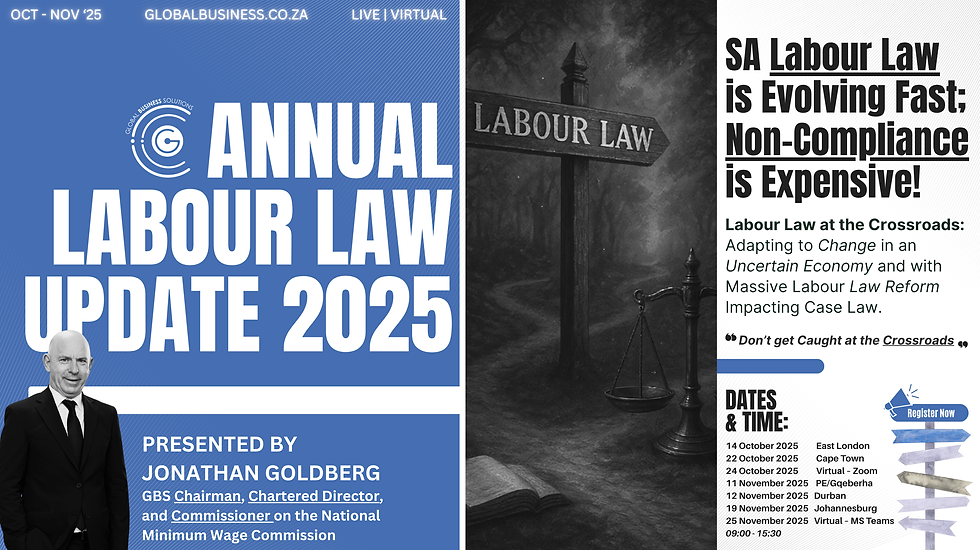Prescription of an Arrear Wages Claim
- Jonathan Goldberg

- Oct 14, 2025
- 3 min read

In the matter of Potgieter v Samancor Chrome Limited ta Tubatse Ferrochrome (JA91/22) [2025] ZALAC 15; [2025] 5 BLLR 483 (LAC); (2025) 46 ILJ 1708 (LAC) (10 March 2025).
The Labour Appeal Court (LAC) recently heard an appeal by an employee in a case against his former employer. The matter centred on whether the employee’s claim for arrear wages had prescribed.
The employee was dismissed on 24 October 2006. He challenged the dismissal at the Metal and Engineering Industries Bargaining Council (MEIBC), which on 25 June 2008 found the dismissal to be substantively and procedurally unfair and awarded compensation equivalent to 12 months’ salary. Unsatisfied, the employee sought retrospective reinstatement through the Labour Court (LC). When this was dismissed, he appealed to the LAC, which on 12 June 2014 ordered his retrospective reinstatement. The employer’s further appeal to the Constitutional Court (CC) was dismissed on 3 September 2014.
The employee was reinstated on 23 July 2015 and a mutual separation agreement was concluded on 30 November 2015. A dispute then arose about the scope of arrear wages due to him. The employee believed he was entitled to payment from the date of his dismissal through to the LAC’s reinstatement order. His employer disputed this, prompting further legal action.
On 23 July 2018, the employee instituted a claim for the arrear remuneration. The matter came before the LC on 29 May 2020 and the parties agreed to clarify the LAC order's effect through further proceedings. However, the employer subsequently raised a special plea of prescription, arguing that the claim had prescribed three years after the LAC’s 2014 order.
The LC upheld the employer’s plea, finding the claim had prescribed under section 11(d) of the Prescription Act, with prescription running from 12 June 2014 or at the latest 3 September 2014. Since the employee’s claim was launched in July 2018, the Court concluded it was out of time.
On appeal, the LAC found that this approach was incorrect. Citing Constitutional Court authority, it held that a reinstatement order merely revives the employment relationship, and that any contractual claim for arrear wages only becomes due once the employee is reinstated. In this case, which occurred on 23 July 2015. Accordingly, the three-year prescription period would have expired on 24 July 2018.
Significantly, the employee launced his initial claim on 20 July 2018—within the prescription period. Although this claim was later withdrawn, the LAC found that it was withdrawn for procedural clarity, not abandonment. The proceedings that followed were considered a continuation of efforts to recover the same debt and therefore, interrupted prescription under section 15 of the Prescription Act.
The LAC concluded that the employee had not abandoned his claim and that prescription had been properly interrupted. It set aside the Labour Court's ruling and dismissed the employer’s special plea of prescription.
Join us at the Annual Labour Law Update. This year's theme is Labour Law at the Crossroads: Adapting to Change in an Uncertain Economy and with Massive Labour Law Reform Impacting Case Law. What you'll gain:
Master the Digital Transformation of Labour Law in 2025
200+ Labour Law Cases Unpacked by Jonathan Goldberg
Critical Updates on Upcoming Legislation & NEDLAC Amendments
Navigate Workplace Challenges from the Digital Era to Discrimination Laws

View our upcoming events: Upcoming Events, like Landmark Judgment: Equal Parental Leave for All Parents, Employment Equity Reporting, Managing Absenteeism in the Workplace, and #ALLU2025.
*All workshops are offered as customised in-house training that can be presented virtually or on-site.
"Global Business Solutions (GBS)—Your Partner in Strategic HR Compliance"









Comments